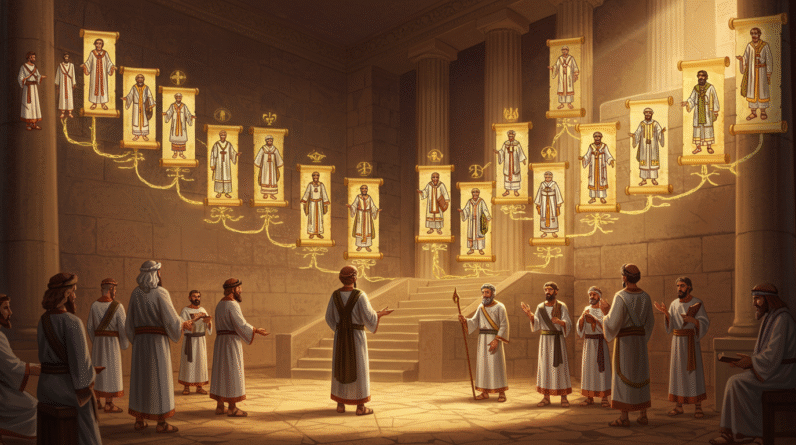Explore the quiet yet essential role of Ithamar, son of Aaron, in biblical history, highlighting his understated contributions to the lineage of priests.

Ithamar: A Silent Pillar in the Priesthood
Imagine a figure standing quietly in the shadows of history, his life interwoven with the early days of the priesthood. While his name might not trigger immediate recognition, Ithamar, son of Aaron, plays a subtle yet influential role in biblical history. His contributions, though less overt than his elder siblings, leave an indelible mark on the lineage of priests and their divine service. This article delves into the life and legacy of Ithamar, exploring the intricate tapestry of his existence and uncovering the lessons his story holds for us today.
Who Was Ithamar?
Ithamar, the youngest son of Aaron, was born into one of the most critical families in biblical history. As recorded in Exodus 6:23, Aaron was married to Elisheba, daughter of Amminadab, and they had four sons: Nadab, Abihu, Eleazar, and Ithamar. Ithamar’s lineage granted him an innate role in the nascent priesthood—a responsibility that came with both honor and immense duties. Unlike his elder brothers Nadab and Abihu, whose lives ended prematurely due to disobedience (Leviticus 10:1-2), Ithamar’s path was one of quiet dedication and service to God.
Key Moments in Ithamar’s Life
Ithamar’s life, as detailed in the scriptures, is marked by several significant moments that highlight his pivotal yet understated contributions. One of his earliest recorded roles was assisting Moses and Aaron in constructing the Tabernacle. Ithamar was entrusted with overseeing the Levites and their work, a testament to his reliability and organizational skills (Exodus 38:21). His steadfast religious commitment continued as he became a priest serving in the Tabernacle alongside his brother Eleazar after the tragic death of their elder siblings.
During the Israelites’ journey through the wilderness, Ithamar played a crucial role in managing the sacred duties assigned to his family. The Book of Numbers describes his responsibilities in handling the offerings and sacrifices, ensuring that the divine instructions were meticulously followed (Numbers 4:28). His quiet diligence allowed the rituals essential to Israelite worship to be conducted smoothly and with reverence to God.
Lessons We Can Learn from Ithamar
Though Ithamar might seem a silent figure compared to more prominent biblical figures, his life offers rich lessons in humility, service, and faithfulness. One of the most compelling lessons from Ithamar’s story is the value of steadfastness in one’s duties, even if they are not performed on the grandest stage. Ithamar’s quiet service underscores the importance of supporting roles and the impact of working diligently behind the scenes. For modern believers, his example teaches the value of remaining faithful to one’s responsibilities and contributing to the community, irrespective of recognition.
Ithamar also exemplifies humility. Unlike the spectacular failures of his elder brothers’ disobedience, Ithamar adhered to divine law without seeking personal glory or recognition. His life reminds us that spiritual maturity often involves prioritizing obedience over ambition.
Biblical References & Context
Throughout the Bible, Ithamar is mentioned in several key passages that illuminate his life and responsibilities:
- Exodus 6:23: Establishes his lineage as one of Aaron’s sons.
- Exodus 38:21: Records Ithamar’s oversight in the construction of the Tabernacle.
- Leviticus 10:1-2 2 details the downfall of his elder brothers, indirectly elevating Ithamar’s role.
- Numbers 4:28: Highlights his role in handling the offerings.
Each passage contributes to the portrait of Ithamar’s quiet leadership and faithfulness in serving God.
Ithamar in the Bigger Picture
Ithamar’s role in the priesthood set a precedent for future generations of priests and Levites, confirming his place in God’s grand tapestry. His descendants, including Eli and the line of priests in Shiloh, continue his legacy into the time of the Judges. Ithamar’s life exemplifies the endurance of God’s covenant with the Levites, as his family maintained significant religious roles through turbulent periods. Moreover, his contribution aligns with the continuous thread of faithful service that advances God’s purpose through history, setting the stage for the ultimate high priest, Jesus Christ, who would establish a new covenant (Hebrews 4:14).
Final Thoughts
In an era where instant recognition and visibility are often the measures of success, Ithamar’s life serves as a gentle reminder of the power of quiet dedication and behind-the-scenes impact. His devotion and reliability in serving God and his community underpin the silent strength that supports extraordinary achievements. May Ithamar’s story inspire you not only to explore the depth of biblical histories but also to value the unseen contributions in your own life and the world around you.
Acknowledgment: All Bible verses referenced in this article were accessed via Bible Gateway (or Bible Hub).







